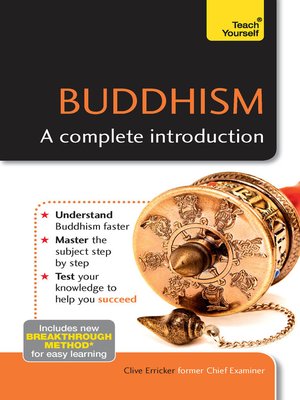
Sign up to save your library
With an OverDrive account, you can save your favorite libraries for at-a-glance information about availability. Find out more about OverDrive accounts.
Find this title in Libby, the library reading app by OverDrive.



Search for a digital library with this title
Title found at these libraries:
| Library Name | Distance |
|---|---|
| Loading... |
Buddhism: A Complete Introduction is a comprehensive and easy-to-use introduction, designed to give you everything you need to succeed, all in one place.
Written by a leading expert, this book will help you if you are studying for an important exam or essay, or if you simply want to improve your knowledge.
It is structured to mirror the way in which Buddhism is usually taught, starting with the life of the Buddha through to the prospects of Buddhism for the next generation.
The book covers all the key areas that are considered central to Buddhism, including the Buddha's teachings, the scriptures and schools, the role of meditation and the moral and ethical context. It uses jargon-free English and includes features such as guided further reading and end of chapter questions to ensure that you understand all the concepts covered.
Buddhism: A Complete Introduction includes:
Chapter 1: Buddhists and Buddhism
Chapter 2: The life of the Buddha
Chapter 3: The Buddha's teaching
Chapter 4: Buddhist scriptures and schools
Chapter 5: Meditation and devotion
Chapter 6: Ethical conduct
Chapter 7: Moral Issues
Chapter 8: The social order
Chapter 9: Festivals and ceremonies
Chapter 10: Budhist today: East and West
Chapter 11: Transition, adaptation and influence: prospects for Buddhism in the twenty-first century
Learn effortlessly with a new easy-to-read page design and added features:Not got much time?
One, five and ten-minute introductions to key principles to get you started.







